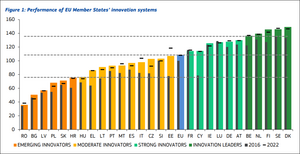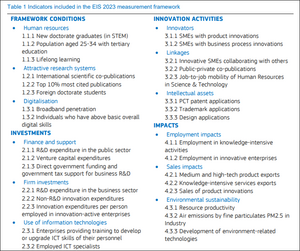European Innovation Scoreboard 2023 released today
The twenty-second edition of the European Innovation Scoreboard (EIS), which provides a comparative analysis of the research and innovation performance of EU Member States and selected third countries, was published today, 6 July 2023. The EIS presents and compares the relative strengths and weaknesses of countries’ research and innovation systems and helps policymakers assess areas in which they need to concentrate their efforts in order to boost innovation performance.
Prepared as an informational report for the European Commission, the EIS assesses EU Member States in addition to 11 other European countries and 11 global competitors through a methodological approach that combines data for 32 statistical indicators (see appendix below) into a composite index measuring overall innovation performance. The framework including these 32 indicators has been revised several times since the first release of the EIS in 2001 through consultations with policymakers, academics and other stakeholders, with the last revision in 2021.
“The EIS has become an important measurement tool that is used by policymakers to identify strengths and weaknesses of the research and innovation systems of their countries. The EIS has also been an important ‘inspiration’ for many scientific articles, by academics using the data at both country and regional levels for their own analyses and for critically assessing our approach,” says Hugo Hollanders, senior researcher at UNU-MERIT who coordinated a team of colleagues – including Nordine Es-Sadki, a co-author for more than 10 years – to prepare the report.
[Read our recent Q&A interview with Hollanders about the evolution of the EIS here.]
Key results of the EIS 2023:
🇪🇺 Analysis of EU Member States
Among EU member states, the EIS 2023 finds that:
Belgium, Denmark, Finland, the Netherlands and Sweden are ranked as ‘Innovation Leaders’ with innovation performance above 125% of the EU average.
Austria, Cyprus, France, Germany, Ireland and Luxembourg are ‘Strong Innovators’ with performance above the EU average.
Czechia, Estonia, Greece, Hungary, Italy, Lithuania, Malta, Portugal, Slovenia and Spain are ‘Moderate Innovators’ with performance below the EU average.
Bulgaria, Croatia, Latvia, Poland, Romania and Slovakia are ‘Emerging Innovators’ with performance well below the EU average (<70% of EU average).
Overall, the EIS finds that most EU Member States have increased their innovation performance over the past 8 years with the innovation performance of the EU increasing by 8.5 percentage points since 2016.
Innovation performance increased in 25 EU Member States, and performance has increased most in Cyprus, Estonia, Greece and Czechia (by 20 percentage points or more). Overall, the following indicators recorded the highest improvements: business process innovators, international scientific co-publications, job-to-job mobility of human resources in science and technology, and venture capital expenditures.
Between 2016 and 2023, performance differences among the 27 Member States have become somewhat smaller. Performance differences have narrowed most within the groups of Strong Innovators and Moderate Innovators. At the same time, the performance differences within the group of Emerging Innovators have not narrowed, and they are not catching up to the next group of Moderate Innovators.
Compared to last year, innovation performance is growing at a slower pace. Between 2022 and 2023, the annual innovation performance of the EU has improved at a reduced rate of 0.6 percentage points. Innovation performance increased in 19 Member States, most in Czechia, Bulgaria and Poland (by 5 percentage points or more) and has declined in eight Member States.
🌏 Beyond the EU
Denmark has now become the most innovative Member State, but Switzerland is the most innovative European country thanks to the highest performance on education-related indicators, scientific publication and environment-related indicators.
Globally, the EU has closed part of the performance gap with some of its competitors, including South Korea, which is the best performing country overall in the EIS 2023.
The Regional Innovation Scoreboard 2023
Alongside the EIS, the accompanying Regional Innovation Scoreboard (RIS) 2023 was also published today, similarly offering a comparative assessment of the research and innovation performance of 239 regions in 22 EU Member States, Norway, Serbia, Switzerland, and the United Kingdom. (Cyprus, Estonia, Latvia, Luxembourg and Malta are included at the country level, as in these countries the regional level is identical to the country territory.) The RIS finds that innovation performance has increased between 2016 and 2023 for 211 regions across Europe; in more than half of the countries assessed, performance has increased for all their regions; and 126 regions have increased relative to the EU average.
The 2023 European Innovation Scoreboard and the Regional Innovation Scoreboard have been prepared for the European Commission, Directorate-General for Research and Innovation, Directorate G – Common Policy Centre, Unit G.1 – Common R&I Strategy & Foresight Service.
Appendix
ANY COMMENTS?
MEDIA CREDITS
Images and video: European Commission





